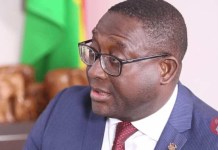While a significant cross-section of the Ghanaians populace is bitterly complaining about the prevailing economic challenges in Ghana, the officials of the governing New Patriotic Party (NPP) are claiming the complaints are mere stunts aimed at discrediting the government.
One such official of the NPP who dismissed the complaints is the Director of Communication of the party, Yaw Buaben Asamoah.
According to him, the country is in a good state and that the complaints are induced by the opposition National Democratic Congress (NDC) and their flagbearer for the 2020 presidential election, John Dramani Mahama.
Speaking at a press conference at the party’s headquarters in Accra today, Friday, August 20, the NPP Director of Communication said, “We are not frightened of John Mahama, we know he cannot manage the economy, so we can’t let him poison your minds because if you’re sitting your somewhere and they keep telling you ‘oh it is bad, Ghana is hard, there is corruption, Ghana is hard’. Then sometimes, you think it’s true. So we have to speak back.”
Buaben Asamoah’s dismissal of claims of economic hardship re-echoes a similar claim by Vice President Mahamudu Bawumia, who claimed that despite the Akufo Addo administration having racked up more public debt than all previous governments combined since Ghana’s Independence, the debts shows that the NPP administration is indeed delivering monumental economic solutions.
Bawumia also blamed the NDC for blowing the economic situation out of hand.
Incidentally, the government itself had admitted the harsh economic realities in the country, with its inability to deliver certain promised social infrastructure. The government claimed it was the fault of the COVID-19 pandemic.
Now, it appears, the blame has shifted to the alleged machinations of the NDC.
Meanwhile, almost all the multi-lateral donor agencies and international rating organisations have warned that the astounding public debt levels brought about under the Akufo Addo administration had driven Ghana to a debt unsustainability level.
Currently, Ghana’s debt levels are hovering around 80% of the country’s GDP. Consequently, rating agencies have dropped Ghana’s creditworthiness metrics, signalling that the country may be forced to source concessionary loans at higher rates; investors would have an aversion to doing business in the country and hence, not much economic growth and social infrastructure can be achieved.
The harsh reality would also force local banks to up their rates which would rob of on the cost of goods and services and thus shoot prices higher than would be comfortable for the citizens.















